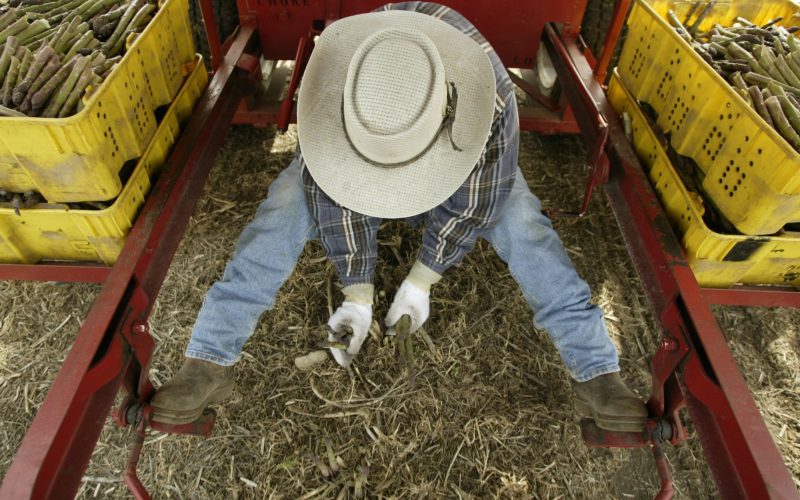After concluding that Oregon-based Cal Farms had violated the rights of a Madras man by employing temporary foreign laborers over him, a qualified U.S. citizen, for seasonal field work, a federal jury awarded him $190,000 for emotional distress and $17,000 for missed pay.
Cal Farms, a family-run firm that grows, packs, and ships over 30 organic and sustainably grown fresh market vegetables, was sued by Virgilio Carvajal, who claimed that the company discriminated against him due to his U.S. citizenship in favor of foreign workers. The business runs farms in Portland, Boardman, Madras, and Oregon City.
In the lawsuit, Cal Farms was accused of using the federal agricultural guest worker program, or H-2A, which permits temporary foreign workers to be brought into the country by agricultural employers only in cases when there aren’t enough eligible American workers to fill the positions. Additionally, the business must demonstrate that hiring foreign labor won’t compromise American workers’ pay and working conditions.
The government program, designed to assist farmers with seasonal surges in labor demand, permits firms to hire foreign-born individuals to temporarily enter the United States for a maximum of one year at a time.
According to federal data, the number of authorized H-2A employment and visas in the United States rose by more than 50% between fiscal 2018 and 2023. In 2023, the State Department issued nearly 310,000 H-2A visas. Nearly 90% of them fell into one of the following occupations: greenhouse, nursery, crop, or farmworkers and laborers.
D. Michael Dean, one of three attorneys who represented Carvajal from the Northwest Worker Justice Project, a nonprofit legal organization that advocates for low-wage, immigrant, and non-salaried workers, said the verdict is remarkable because it’s uncommon to receive a damages award for emotional distress and to discover that a company discriminated against someone based on their U.S. citizenship.
According to Dean, Mr. Carvajal would have benefited from a contract to which he was entitled since he was a citizen of the United States.
Experienced farmworker Carvajal, at 61, filed for jobs covered by Cal Farm’s H-2A contracts in 2019 and 2020. He was born in Mexico and obtained U.S. citizenship in 2013. The Oregon Employment Department had recommended Cal Farms to him.
According to his attorneys, neither year did he get a job in the field in Madras.
This is in spite of Cal Farms’ representation that, in accordance with the law, it would employ eligible, qualified U.S. workers who applied for such positions during the first half of each contract period. Cal Farms committed to only turning away American employees for legitimate, work-related grounds.
The fact that H-2A workers do not report to work was not the point. “We cannot allow the H-2A worker program to prevent a U.S. citizen who has worked on farms all his life from providing for his family,” Dean stated.
Carvajal’s attorneys claimed that Cal Farms filled the jobs he had applied for with dozens of temporary, non-immigrant H-2A workers.
Carvajal had previously worked 10 days on the farm for Cal Farms in 2008, but he quit during the busiest time of the harvest, and there were still five months of work available. Cal Farms retorted that the company would not rehire workers who did not finish their contract.
According to Carvajal, he was let go by the corporation in 2008. According to court testimony, Cal Farm’s records simply listed the dates that Carvajal worked in 2008; they were quiet on the specifics.
According to court documents, Carvajal stated during his 2019 interview that he had worked for the company in 2008 and that Cal Farms had decided he was not eligible for rehire.
However, following more discussions with a state monitor for the Migrant Seasonal Farmworker Program, Carvajal accepted the job offer from Cal Farms after attending an orientation.
However, Madras’s unusually cold and rainy April 2019 weather put a stop to crop harvesting, and Cal Farms promised to contact Carvajal with a start date. According to his attorneys, Cal Farms didn’t call him until June of that year, and by then, he had secured employment elsewhere.
Cal Farms had hired dozens of temporary, non-immigrant foreign workers for the position that Carvajal had sought, according to the 2019 job order, and the temporary H-2A workers were scheduled to begin working for the company on March 1, 2019, through December 15, 2019.
Three of the approximately 40 non-immigrant laborers that Cal Farm had brought in to work in Madras were given free transportation to work on a farm in Oregon City, according to Dean.
According to Dean, it’s very obvious that he was cooling his heels while waiting for a call to report to work for at least two weeks while other H-2A workers were being housed, transported, and employed.
Dean depicted Carvajal as the leader of his household who, via essentially backbreaking seasonal farm work, was able to send two of his five children to college.
Dean claimed that although he is proud of his achievements, he was eventually reduced to nothing. He hadn’t had a job since October of the previous year when he applied at Cal Farm in 2019.
According to its lawyers, when Carvajal reapplied for a job with Cal Farms in June 2020, the firm informed him that he was ineligible because he had failed to show up for the 2019 job when the company phoned him for work.
According to court documents, Cal Farms attorney Timothy J. Bernasek stated that the decision to deny Carvajal’s application at the time was made for a legitimate, work-related cause. Messages asking Bernasek for comment on Tuesday went unanswered.
Following a four-day trial before U.S. District Judge Adrienne Nelson in Portland, the 12-member jury returned the verdict on February 7.
The jury found that Cal Farms discriminated against Carvajal in 2019 and 2020 and broke the Migrant and Seasonal Agricultural Worker Protection Act. However, the jury concluded that in 2020, Cal Farms did not discriminate against Carvajal.
Dean claimed he was unable to explain the jury’s divided verdict.
Despite being popular in most states, the H-2A program is very new in Oregon and is expanding quickly. Both U.S. citizens and foreign workers hired under the program are paid roughly $15 per hour; however, U.S. citizens are free to move around, whereas temporary non-U.S. citizens are only allowed to work for the company that has a contract with them.
— Maxine Bernstein writes about criminal justice and federal courts. You can contact her via [email protected], 503-221-8212, X@maxoregonian, or LinkedIn.
Your support is essential to our journalism. Sign up for OregonLive.com now.
Stories by
Maxine Bernstein
-
Oregon s U.S. Attorney Natalie Wight removed from job by Trump administration
-
Appeals court upholds convicted eco-saboteur Joseph Dibee s $82K restitution
-
Feds pay nearly $8M to Oregon man shot in face with munition during 2020 protest
-
Court upholds DEA denial of Seattle doctor s request to use psilocybin to treat terminal patients
-
Oregon man who placed clandestine camera in shower gets lengthy prison term










